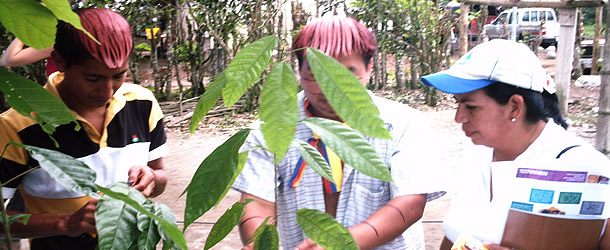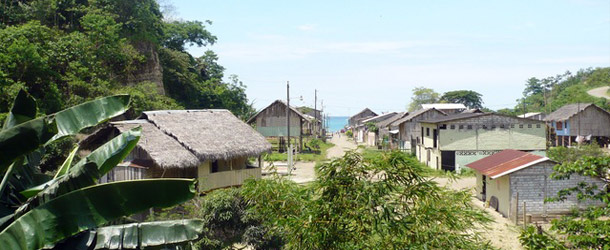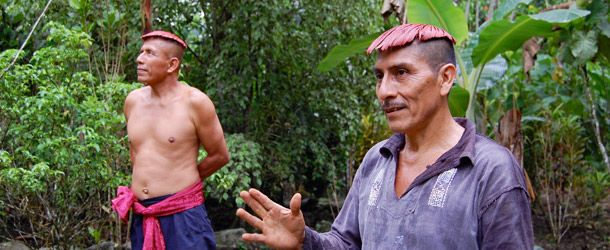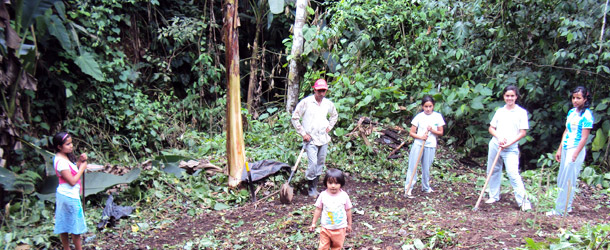A Bua Volunteer Diary
Six weeks with "los Tsachilas del Bua" (June 5th -July 12th, 2007)
Day 1. I arrived in the Bua Community with Azalia, the person who is going to follow the project from the Foundation, and 5 other volunteers who are just here for the day. We stopped at the school, where hoards of children where playing on a barren field, with classrooms made of plastic sheets, decaying buildings. On the way to my host family I saw lots of green fields, dotted with banana trees and wooden huts scattered here and there along the road. Barefoot children walked along the road under a wholly gray sky. And then the place where I'm going to stay, with no electricity, no running water (besides the river), and I felt I had landed - not on a different continent - but on a different planet. Landing has been soft, but still, I am now on a different planet.
It all happened fast: I had decided I wanted to teach English somewhere, to use my recently acquired skill, to do something that would look good on my CV and use my time somewhat productively and Latin America was chosen because I had a good feeling for the country and I could manage the language. The rest all happened by chance: finding a Dutch Foundation which had links in Ecuador, a phone call to them to get more information, them asking me: would you be willing to go to a small tribe in the forest? Sure I would: I'm strong, flexible, and open-minded - of course I would. So it started. But I knew very little of Ecuador and nothing of the Tsachilas. And I didn't have much time. Getting information on the trip, arranging for the vaccines, buying the medicines, all the various things to carry and so on. I studied the Lonely Planet a bit and I tried organizing the essentials for the two-week holiday that we managed to scrap up with my partner. And off we went: two wonderful weeks in Ecuador. But now my partner was gone and I was alone in Bua, wondering why I was here, and still hardly knowing anything about the place and what exactly I would be doing.
At last I get to meet my host: Alfonso: he is wearing black old-styled pants and black shoes (the kinds our fathers would wear), and then he is bare chest, has black stripes on the body, arms and face, a red shawl, red-dyed hair, black hands and feet. To me he looks like two half-men joined at the waist. And he looks so serious: had I met him alone in the forest I would have been scared. The group of volunteers is now leaving to go back to Quito. They came for the day, I'm staying here for six weeks and with a pang in my stomach I think that now I'm really alone in this place..
Day 2-4 I go to school where I'm regarded as an expert on child education. Well, I'm no expert - I used to be a biologist and only recently switched to teaching foreign languages- and I teach mostly adults. The school is very Spartan, to say the least, the bathrooms are sickening and discipline is a very weak point: the teachers have to constantly shout to get the pupils' attention. It's very tiring! I start working in "El Jardin" (the kindergarten) with children who are 4.5 to 6 years old.
The nearest Internet connection is one hours away, and I have no cell phone here, which makes communicating with any outsider a half a day business. I take my first bath in the river: the water is chilly and I find it difficult -almost impossible- not to get my feet soiled upon stepping back on the riverside. When I try washing my clothes for the first time in the river I lose a bra in the stream. And the clothes take days to dry: I hang them out and it rains and a day later they are as wet as when I pulled them out of the river! The sky is almost always gray and I'm longing for a bit of sunshine.
Going to the bathroom (a little far away from the house) at night is also a problem: it often rains, or rather pours, and the soil gets very slippery for my flip-flops.
People here are nice but shy and withdrawn and not very talkative (and so am I), some of them speak with a heavy Tsachila accent and communication in Spanish is not always easy. It's difficult to get close. I learn I'm the first volunteer who is going to stay here this long and I feel a bit like a guinea pig.
The evenings are very long and by candlelight even reading a book is not a real pleasure. I am a bit stressed about having so much time with nothing to do and the Tsachilas' life seems even stranger because they don't have any "real" occupation.
But the worst thing is the mosquitoes and bugs that are really killing me: the repellent doesn't do much, and the little bugs get under my pants. I'm so badly bitten that the itching keeps me awake at night. And Alfonso and his wife Germana sleep right next to me, in another small room, separated just by a thin net: I hear them talk and I'm wary about dressing and undressing. I wish I had a bit more privacy.
I begin to think that with my 46 years I've really grown too old for this kind of things..
Day 5.I have to go Quito to get my 3rd rabies shot (a dog bit me in Quilotoa 2 weeks ago). I take the bus with the Shinopi Bolon (the Tsachila cultural group)-they are going to Puhilí for a dance festival and they'll drop me off on the way where I can catch another bus for Quito. Funny: there I am, the only gringo (well, any white foreigner here is seen as a gringo) on a bus full of more than 30 Tsachilas, all dressed up and excited about the trip. Their excitement is contagious: I realize that I have no reason for wanting to be in Quito that early (I'm longing for a hot shower and a mosquito-free weekend, but both really can wait a few more hours!) and after about half an hour on the bus I ask Alfonso if I could spend the day with them and go to Quito in the evening. Of course it's no problem.
Puhilí is a nice place, the day is sunny but it's not a success for the group, who, after a long wait, doesn't get to dance at all, for some political mess up. On the way back they're still as cheerful as usual. They drop me off and I get to Quito, where I feel almost at home. And I do get a -relatively- nice hot shower and mosquito-free evening!!
Day 6. I get my rabies shot and I head back for Santo Domingo and Bua. It's hot and sticky. When I arrive after 4 hours on the bus to Santo Domingo (it's usually no longer than 2:45!) and an additional hour to get to Bua, Alfonso and Germana welcome me smiling: for the first time I almost feel I've come back home. The day is still sunny and warm and I'm sweaty from the bus ride: a bath in the river is a relief and a pleasure. I'm back in this funny house full of people (besides Alfonso's daughters, son and mother who are often around, some people of the Shinopi Bolon drop by almost every day) and animals (three dogs, various chickens, sometimes a pet rabbit and a sloth -also a pet-) that are all running freely around the place.
Week 2. Oswaldo- a school professor- takes me to school every day on his motorbike. I'm getting to know the kids at school and I am slowly being accepted. The children are curious, they talk to me, touch me, get me involved in their little problems, and play with me: they are very sweet and I'm doing my best to work well with them. Rosa, the teacher in the Jardin is really good and we get along well. Most people are really nice. I've started giving English classes to the teachers as well, and I enjoy working with them as much as with the children and above all it's a great way of getting to know them better.
At home people are curious, although they don't show it very much: they are still shy and withdrawn, but when they (Alfonso and his family, Freddy- a good family friend, his son Richard, etc) get a chance, they ask me a lot of questions on my country, how we live, what we eat, do we use cars, what is my family like, do we have seasons, etc. I begin to feel that I am slowly being accepted. Their ignorance of the world surprises me, but after all, what did I know about them before coming here?
I spend a lot of time at home with the youngsters: they are less shy, they want to play, and they ask me how to say things in the languages I know: it's fun to spend time with them.
The weather is slowly improving: it's getting a little drier and the number of mosquitoes has slightly decreased.
I spend some time preparing the classes for the next day, for the rest I'm free to walk around, play, and chat. But Alfonso and his family are often working in and around the house.
First weekend in Bua: two students from Quito are here for the weekend and with them I get to see the whole show of the Shinopi Bolon: how they paint their face and body with black stripes and their hair red, the typical food, ecological path, their music and dance. Finally I'm learning a bit more of their culture. But there is still something that clicks between me and the two guys: despite them being half of my age and Ecuadorian, we somehow identify each other as "more similar" in comparison with the Tsachilas who are "different".
Week 3. I wake up every day at 6: my hosts are already at work and the noises wake me up. There's always someone working in the kitchen, sometimes Alfonso is working around the house or in the garden, he is cleaning, taking care of the plants, carrying water up from the river, other times he's already gone with the 6 o'clock bus to some meeting, supporting some petition, talking with some politician about the community, etc.
School is becoming more and more satisfactory. By now I have toured through all the grades so that all the kids know me and they often talk to me and ask me all sort of questions. I'm getting to know my little group in the "Jardin" better. It's great fun working with the teachers, and they are very good about being students again in my class. Pupils often peek in from the windows to see what their teachers are doing there all by themselves.
One afternoon I go to Santo Domingo with two young people I have just met at Alfonso's place. They take me on a tour in the city and the best part of this is the warm welcome at their mother's house with a great lunch included (I wasn't expected and it wasn't even lunch time).
The feast of Santo Domingo begins and it's another great outing with the whole group: again I get to see all the preparations but this time I can follow them through the streets of the city during their music and dance show. Afterwards we all dine together in Santo Domingo. I'm feeling more and more part of the group. Somehow it has become normal to be with them. One evening Elisabeth paints black stripes on my arms and I think it looks nice.
Week 4. On Monday I'm invited to go to the City Hall: the school is going to receive a prize and, as a teacher, I'm also invited to the ceremony. I dress up with the traditional Tsachila skirt (chumbillina) and that is highly appreciated. Walking around with Alfonso, Germana and Freddy I feel proud of being with them, almost one of them. By now it has become absolutely normal to see them dressed up as they are to the extent that I find them a lot more good-looking this way and almost bland where they're wearing standard Western clothes.
One day, when I get back home I'm told that Richard has been bitten by a poisonous snake. Richard spends almost every afternoon and sometimes evening in Alfonso's house. He works, chats, plays the marimba (and he's good at it), and he's very curious: he wants to learn languages and asks a lot of questions on the countries I know. He's the person I'm getting to know best. He's only 15 years old. And I've already heard lots of stories about people who have died as a consequence of snakebite and I know that if you're not treated and not fast enough - you die. I hear that Alfonso took charge of the situation as fast as he could and the prognosis is not bad, but nothing is sure. In the evening I go to the hospital in Santo Domingo with Alfonso and Germana to see how Richard is doing. He's drugged to overcome the pain, mostly fast asleep, anyway he would be extremely weak. His father Freddy and his brother Raffa are there. Seeing Richard lying in bed in this barren room, gives me a punch in the stomach from which I would never recover completely during my time in Bua. This is life here. Richard is probably going to be lucky: they got him treated very fast, but for other people this is not possible and if it is, some can't afford to pay for the antiserum and that means certain death. Richard's family is very poor, but the Shinopi Bolon is providing for them. I feel closer and closer to them and by now I feel that I can fully place my trust in them.
Week 5. At last I know all the children's names in the "Jardin": they are now 20. Some have still hardly learnt a word in English but others are doing well. On the way to or from school children recognize me and wave calling me "señorita Maria", sometimes their parents wave too. On the bus to or from Santo Domingo more and more often I meet people I know of the Shinopi Bolon and this gives me a sense of belonging there. Most of the Tsachila of the group are still not very talkative, but interactions are becoming a little easier. And the children become more and more friendly and playful: they often get me involved in their games.
Richard is recovering but he still has to take care of himself: eat light and rest a lot because he is still very weak. He is staying in Alfonso's house because his own is too chaotic: they live in his grandmother's house with two aunts and five nieces and with so many people in a limited space, he's better off at Alfonso's. I keep an eye on him, make sure he takes his medicines at the right time, chat to keep him busy, go on short walks with him and Alfonso's youngest daughter, Mariuxi. Richard often asks me all sort of questions on science and the world. He likes watching TV, but, just like most people in Bua, he can hardly distinguish a documentary from a film or a soap: Johan of Arch, George Bush and Harry Potter are all equally unreal and far in space and time.
The weather is improving and when it's sunny the light among the leaves is beautiful and I enjoy going on short walks in the lush vegetation. On a few evenings I get to see a fabulous starry sky: it intrigues me because I can't recognize the constellations as I would in the Northern hemisphere.
A couple of times the sloth (el Mantsa in Tsafiki) gets back at night hungry and starts fumbling around looking for any kind of food and wakes me up. I don't mind him doing so: where else in the world would I get up in the middle of the night to feed a sloth rice and grapes and let him drink water licking my finger?
Week 6. Last few days. I can't believe 6 weeks have almost gone by and it's time to go. I'll have to part from my children at school and from "my" family here.
On Sunday I am delegated to take Richard to the doctor for a check up and he is just fine!
One evening chatting with Alfonso while I am admiring a beautiful starry sky, it turns out he has no clue on what the stars are, man having been on the moon, other continents (he kept on talking of me as North American - I'm European), summer and winter in the other hemisphere, etc. Their total, naïve and blissful ignorance still astonishes me: I couldn't conceive that people like this still existed, yet they do and they are wonderful people too.
A group of nine volunteers has come to work on the Ecological Bathrooms. I keep a bit on the side because I still have things to do for the school, and my routine is more within the family.
Tuesday is my big day: it's my birthday and farewell party. My birthday is actually only going to be in four days, but I'm going to spend that day on the plane. I don't like birthday parties, never throw one for myself, but Alfonso decided to do it. And it's not just for me: it's a way of introducing the Shinopi Bolon to all the volunteers and the schoolteachers.
After a meeting with the teachers in the morning, all of them take on the invitation and come to Alfonso's house: incredibly most of them had never been there before!
I dress up with a chumbillina borrowed from Germana and to fit in with the part I get painted (on my face too- this is going to look funny when I get back to my country.) and walk barefoot. It's my way of saying that I like what they do and I can participate in their life and activities. They do the "usual" introduction of the group, the "usual" activities, like painting the hair, music and dance, but I'm overwhelmed by what they do for me: they have got a huge birthday cake, they give me a chumbillina as a present (later an elderly woman with a girl -I know them but I still don't know their names - will give me a hand-made necklace, and Germana a small purse in the traditional colors), the shaman calls me in during his ritual to give me a "limpieza" (cleansing ritual) for a good farewell and a safe trip and will present me a small wooden lance. To end the feast, I'm asked to plant a small pambil plant (shipompo in Tsafiki), as other volunteers did upon leaving. Alfonso knows exactly who planted which tree. I leave mine here and, as he says, it takes my name, Maria, and I take with me its name: Shipompo. It will perhaps carry fruits in another seventy-eighty years..
Most people go, a few remain and we dance again with the music. "Piatchi" in Tzafiki -the day's dying out-, but this has definitely been my best birthday party ever!
Thursday. Time to leave. I have packed up my things, but it all seems unreal. Last night I had a long talk with Alfonso on his plans, my plans, how I can try to help them... Today the last day has really come. Germana, Mariuxi, Elisabeth and Richard walk with me to the main road. On the way I meet Alfonso's mother, the "abuelita": she's sick but as sweet as ever and hugs me affectionately. I hug everybody, the bus comes and I go. In Santo Domingo I still get to meet Alfonso and his son Daniel: they take me all the way to the bus terminal, where they both hug me discretely: the Tsachilas are not communicative or effusive and this is the maximum they'll ever express, but they're great people and I'm already missing them.
Week 7. A week after getting back home and back with my partner, I still haven't quite recovered. I miss "my" family in Bua, "my" Tsachila friends and the beauty and the peace of the place. I have started including them in my night dreams, but also in my future plans: I do want to go back. After all, I don't think I have grown too old for this kind of things yet.
You can read about Bua here.




